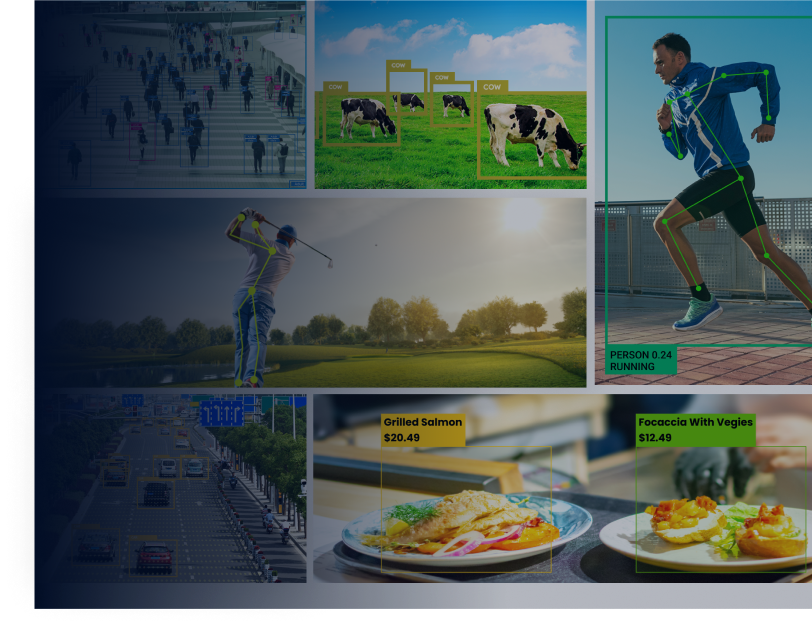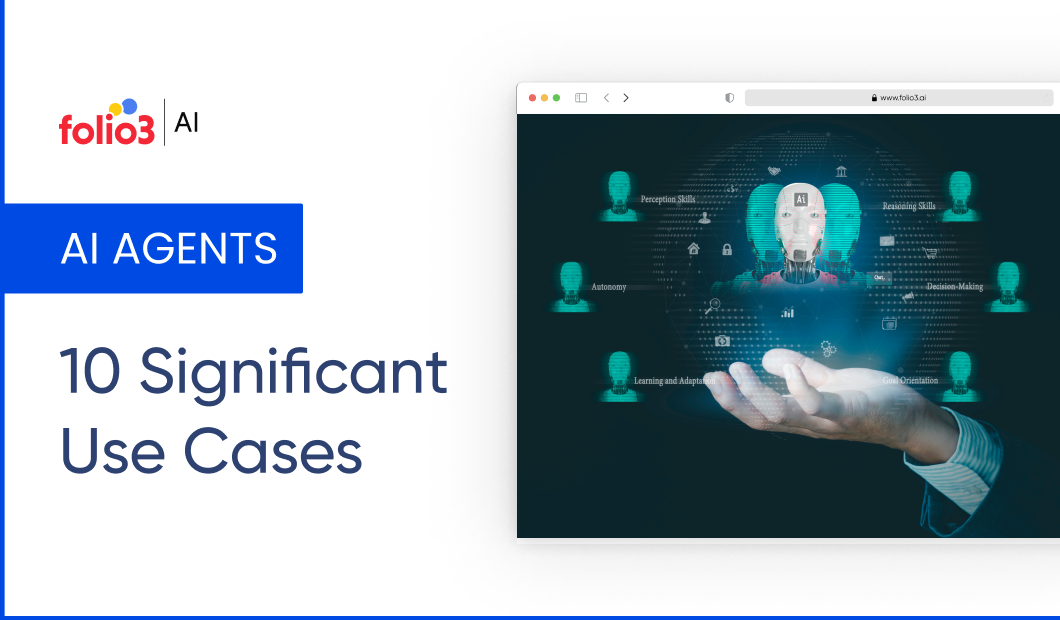Introduction
In today’s fast-paced digital landscape, businesses and individuals are increasingly turning to AI agents for smarter, faster, and more efficient solutions to complex problems. These systems are transforming industries by leveraging advanced technologies to mimic human intelligence and automate critical tasks.
This blog delves into what AI agents are, their significance in a competitive world, and ten transformative use cases with detailed examples.
What Are AI Agents?
Definition of AI Agents
AI agents are smart systems designed to replicate human intelligence and decision-making processes. They utilize technologies like machine learning (ML), natural language processing (NLP), and automation to perform tasks efficiently and intelligently.
How They Work
AI agents operate by analyzing data, identifying patterns, and making decisions based on predefined rules or learned experiences. Key technologies enabling their functionality include:
- Machine Learning: Training algorithms to improve performance based on historical data.
- Natural Language Processing (NLP): Understanding and responding to human language.
- Automation: Executing repetitive tasks without human intervention.
Why Instant Resolutions Are Critical Today
The Need for Speed In a highly competitive business environment, speed is paramount. Organizations must resolve customer and operational issues swiftly to remain relevant.
Rising Consumer Expectations Today’s consumers demand real-time solutions, whether they are resolving queries, making purchases, or seeking support.
Efficiency and Cost Savings AI agents offer businesses an avenue to reduce operational costs while maintaining high levels of efficiency, especially in areas requiring scalability.
Preview of Use Cases
AI agents are reshaping industries by enabling faster, smarter, and more reliable solutions. Let’s explore ten significant use cases that highlight their transformative impact.
1. Customer Support Chatbots
The Role of AI in Customer Service Customer support chatbots are the front-line responders for addressing customer queries. These AI-powered agents can communicate in multiple languages, ensuring inclusivity for global audiences.
Benefits of AI Chatbots
- 24/7 Availability: Providing round-the-clock support.
- Cost-Effectiveness: Reducing dependency on human agents.
- Handling Peak Volumes: Managing high traffic during promotional periods.
Real-World Examples
- Sephora’s AI agent provides tailored beauty consultations by analyzing user preferences and skin types, ensuring a more personalized shopping experience.
- H&M’s AI-driven virtual assistant helps customers by offering real-time recommendations on sizing, product availability, and styling suggestions based on current fashion trends.
- Major airlines leverage AI agents to handle check-in and flight status queries and provide proactive rebooking options during delays or cancellations.
2. IT Helpdesk Automation
Challenges in Traditional IT Support Conventional IT support often struggle with high ticket volumes, slow response times, and repetitive, low-priority issues.
How AI Agents Transform IT Helpdesks
- Automating responses to FAQs like password resets or software installation.
- Intelligent ticket routing to the appropriate human expert for complex issues.
3. Healthcare Virtual Assistants
Addressing Gaps in Patient Support Healthcare systems often face staff shortages and high demand for instant answers. AI virtual assistants help bridge these gaps by offering reliable support for non-critical tasks.
Capabilities of Healthcare AI Agents
- Virtual Triage: Directing patients to appropriate care levels.
- Chronic Care Management: Sending reminders and monitoring patient health.
Notable Applications
- Babylon Health’s AI agents offer in-depth symptom-checking services by analyzing patient inputs and medical histories, enabling more accurate triaging and recommendations.
- Remote monitoring tools powered by AI agents work alongside virtual assistants to deliver real-time health insights and ensure timely medical interventions based on patient data patterns.
4. Sales Enablement and Lead Qualification
AI in Modern Sales Pipelines AI agents filter out sales processes by automating lead qualification and providing instant insights into potential clients.
Key Benefits
- Accelerating lead response times.
- Improving conversion rates.
- Reducing manual workload for sales teams.
Example Platforms
- Drift’s AI agents leverage conversational AI to qualify leads in real time, analyze user behavior, and provide actionable insights for sales teams.
5. E-commerce Personalization and Support
How AI Enhances Online Shopping AI agents personalize customer experiences by analyzing purchase and browsing histories to recommend products.
Customer Journey Automation
- Virtual shopping assistants help users navigate purchases.
- Abandoned cart recovery through AI-driven notifications.
Success Metrics
- Amazon’s Alexa has successfully enhanced upselling opportunities through voice-based shopping assistance.
6. HR and Employee Support
The Need for AI in Human Resources HR departments often struggle with administrative tasks and delayed query responses. AI agents alleviate these challenges by filtering out operations.
AI Agent Solutions
- AI agents filter out the onboarding processes by personalizing employee training, answering complex policy-related queries, and automating leave and expense management workflows with greater accuracy and efficiency..
Case Studies Companies using tools like Workday Assistant have reported increased HR efficiency and improved employee satisfaction.
7. Financial Advisory and Fraud Detection
Challenges in Traditional Financial Services Manual processing often leads to delays in accessing financial advice or resolving fraud alerts.
AI in Financial Resolutions
- Providing instant credit score analysis and budgeting recommendations.
- Real-time fraud detection and immediate alerts for suspicious activities.
Prominent Examples
- Digital banks employ AI agents for strong fraud prevention by continuously monitoring transactions, detecting anomalies, and proactively safeguarding user accounts.
8. Travel and Hospitality Assistance
AI Addressing Travel Pain Points AI agents handle booking queries, itinerary changes, and flight cancellations with unmatched efficiency.
Enhanced Customer Experience with AI
- Real-time updates on delays and baggage tracking.
- AI travel assistants like Expedia’s ChatGPT integration provide smooth planning.
Examples in Hospitality Hotels employ AI for personalized room recommendations and virtual concierge services.
9. Education and E-Learning Assistance
AI Transforming Education Virtual tutors and adaptive learning paths are revolutionizing how students learn.
Use Cases in E-Learning Platforms
- Automated grading and feedback.
- Study plan recommendations tailored to individual progress.
Examples Platforms like Khan Academy and Duolingo use conversational AI to engage learners and enhance retention.
10. Smart Home and IoT Device Support
AI in Connected Homes AI agents troubleshoot IoT devices, respond to user commands, and predict device maintenance needs.
Future Potential of AI in IoT Voice-based problem-solving and predictive analytics ensure enhanced user satisfaction and reliability.
Case Study Smart home ecosystems using AI report increased operational reliability and improved customer experience.
Conclusion
AI agents are revolutionizing industries by improving efficiency, reducing costs, and enhancing user satisfaction. As predictive analytics and proactive issue resolution become mainstream, AI agents will play an even more pivotal role.
AI agents are intelligent systems that use technologies like machine learning, natural language processing (NLP), and automation to mimic human intelligence and perform specific tasks. Unlike traditional automation, which follows predefined rules, AI agents can learn, adapt, and make decisions based on data and contextual understanding.
AI-powered chatbots provide 24/7 support, handle high volumes of queries, and offer instant responses to customer questions. They can operate in multiple languages, improve customer satisfaction, and reduce operational costs by automating repetitive tasks.
AI agents are transforming various industries, including healthcare, e-commerce, education, and financial services. These sectors benefit from AI’s ability to offer real-time assistance, automate workflows, enhance personalization, and improve efficiency while reducing costs.
Ethical considerations include ensuring data privacy, avoiding algorithmic bias, maintaining transparency, and providing clear disclaimers about AI usage. Companies must also ensure that AI agents are used to augment human roles rather than replace them entirely, fostering a balanced approach.









